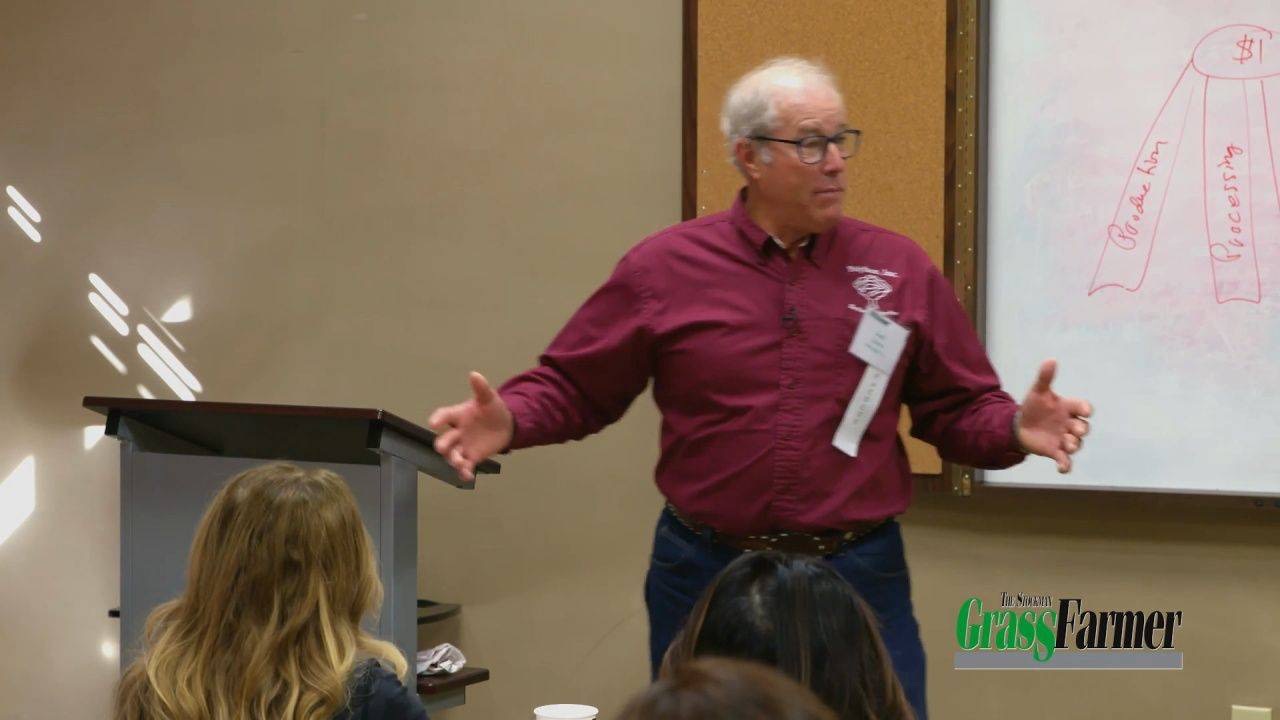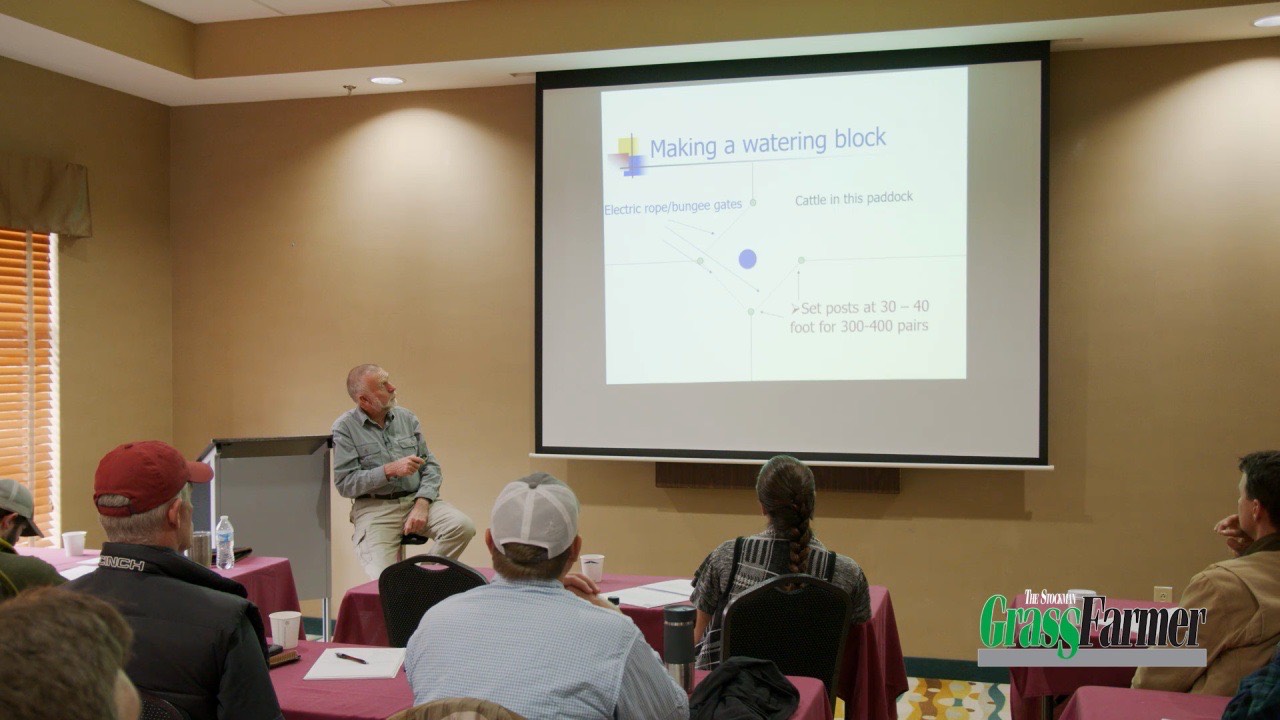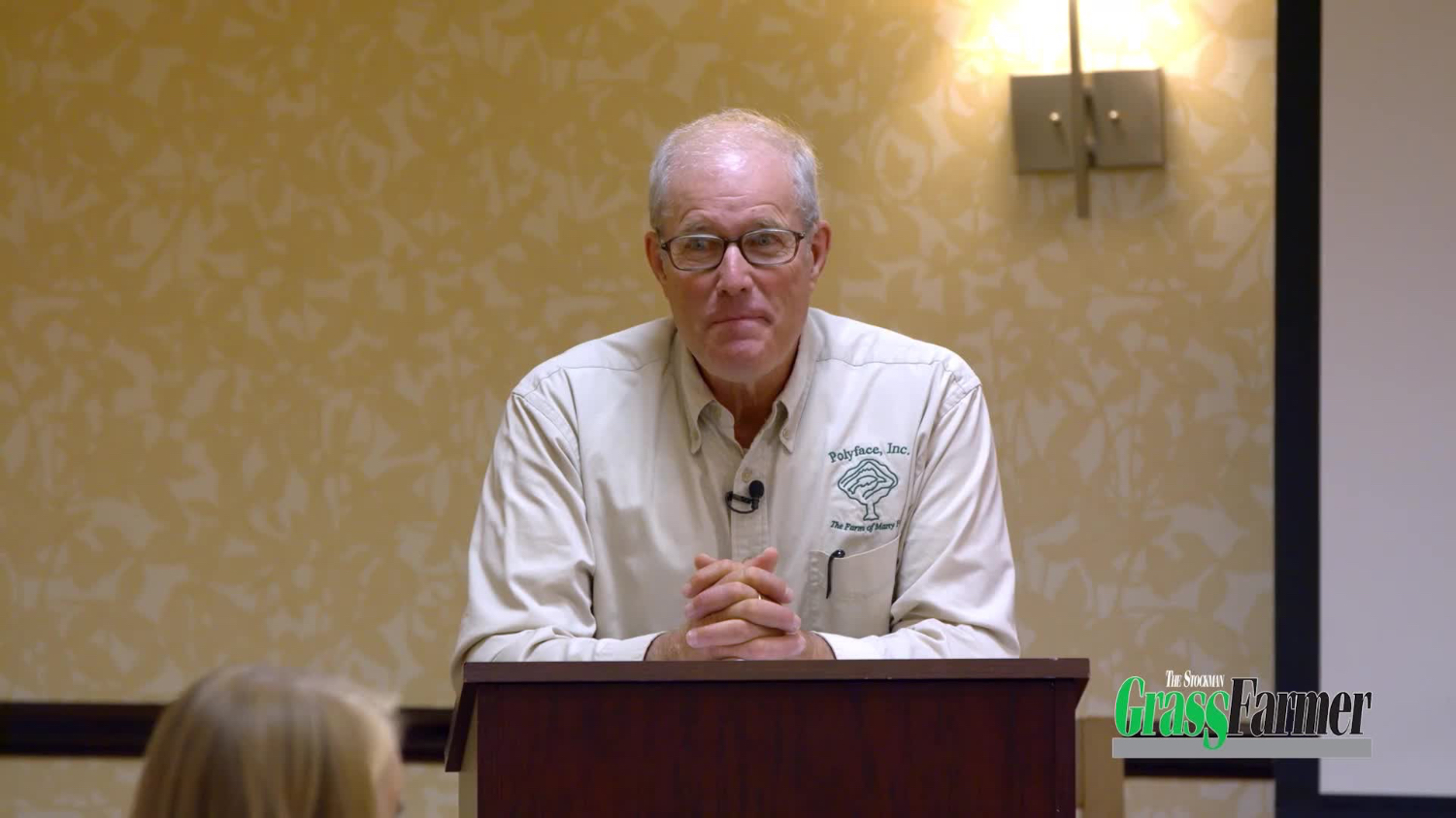Precision Agriculture By Joel Salatin

As precision agriculture becomes the new expression to identify cool farmers, let’s analyze it from a couple of different angles.
For sure, who doesn’t want to be precise? Hundreds of pages in the Stockman Grass Farmer over the years describe in thousands of nuances how to precisely allocate forages.
Measuring dry matter, nutrient analysis, weight gain and studying cow pies receive lots of attention in our journey toward grass farming mastery.
I don’t know any grass farmer opposed to precision. But as the phrase is used in current industrial agriculture parlance, it means a wireless mesh with data nodes on every field and even broadcasting from swallowed meters in cow stomachs. Reading the literature put out by the techno-glitzy proponents of this idea include phrases like a “constellation of sensors around crops” and a “micro-wave ecosystem.”
Steve Kenyon recently encouraged us to think about the value of a drone to send out around a field to check fences in order to eliminate walking or driving around. Like all technology, it has good sides and bad sides. While I think something magic happens when we physically observe our fields, I deeply appreciate the efficiency of sending a drone out to check fence or a water trough.
Like most technologies, though, it doesn’t know where to stop. Or let’s say, the tendency and temptation is to run beyond meeting a basic need and getting mired in computer complexity. I have a friend who fixes farm machinery and he says each brand of tractor has an exceptionally good component that virtually never breaks. He’d like to source those well-made parts and create a mechanical tractor, no computers and no micro-chips. Sounds like a great idea to me. How many of us older farmers have become frustrated with the computers on newer tractors? More bells and whistles adds another level of complexity and costly repairs. Beyond the simple technology is the question about electromagnetic frequencies (EMFs) pulsing on every square inch of land and into the micro-biome of every animal. According to precision agriculture proponents, some 27 percent of farmers are already hooked into the internet of
everything. That means sensors beam data to a centralized point that can do everything from guiding fertilizer applications to diagnosing high path avian influenza before physical symptoms are apparent.
I was on a conference call recently with an attorney involved with a dairy in France that suffered damages due to a cell tower installation on the farm. Milk production dropped 15-20 percent and 40 out of 200 cows died. A judge issued an injunction on the tower and immediately all the problems stopped. Our SGF veterinary columnist Will Winter has developed EMF mitigation devices.
As I understand it, broadband cable hardware is not nearly as problematic as wireless and cell towers. When farmers hook up their crops, fields, and animals to the precision agriculture database, the EMFs are far more powerful than they are from wires. Studies measuring microwave damages are popularizing an overall push back in this movement. Some organizations are calling it a “digital gulag.” As the darling precision agriculture moves forward, it requires millions of sensory nodes that in turn require eminent domain for positioning. Proponents are giddy about the possibilities of an “Ag Alexa.” Imagine being able to beam your cow’s pH, temperature, farts, belches, and cud chewing to a centralized database. Part of the human love affair with bright shiny objects makes such a notion sound cool and awesome.
But another part of human experience makes such a notion sound terrible. If all my farm’s data gets collected at some centralized global database, how subject am I to the control of an orthodox system?
To me, the biggest danger of all this precision agriculture hoopla is that whatever decisions are made as a result of the data dump will be within the context of conventional thinking.
In other words, I guarantee you that if the chickens in a Tyson chicken house show elevated temperature, indicating a low grade infection, “Ag Alexa” will not advise “get those chickens out on pasture where they can get exercise, sunshine, and fresh air.” “Ag Alexa” sounds like putting Anthony Fauci in charge of my farm. That doesn’t appeal to me.
I doubt that precision agriculture will ever look at your soil and advise “you don’t need chemical fertilizer; what you really need is compost so go rent or buy a chipper, get in your woods, and convert some of those trashy trees into chips that you can combine with your livestock manure to make good compost.” Anybody willing to bet such advice will ever happen?
The problem is that all advice in these systems comes from a mechanical industrial mindset. Behind the curtain is a Wizard, and that Wizard analyzes data based on a non-biological approach to food and farming. The phrase precision farming means far more than getting some aerial photos from a drone or using a plant identification app on your smart phone.
One of my favorite books is the encyclopedic Merck Veterinary Manual. I use it for diagnosis but not for treatment. Over the years I’ve found it incomparable for figuring out what is ailing an animal. I’m thankful Merck had enough money to put together such a comprehensive book, but that doesn’t mean I follow much of its therapeutic advice. As you can imagine, most of its advice is a vaccine or pharmaceutical, preferably something made by Merck.
Years ago when we had curly toe syndrome in our broilers, I used the Merck book to get a diagnosis. In the text, it said it was caused by a deficiency in riboflavin (pg. 1,434). While conventional thinking advises an antibiotic to stop the nerve sheath infection, we stopped it with some liver. Appreciating and using the Merck manual does not mean I have to use everything it suggests. In this case, even the Merck manual suggests bolstering riboflavin in the diet. Fancy that.
While opposing precision agriculture makes you sound like a Luddite, the problem with uncontested catch phrases is that they garble communication into a bunch of assumptions that become imprecise. When the agri-industrial chemical complex uses the term precision agriculture, it does not mean accumulating information for your farm that you and only you know. Once data goes into an “Ag Alexa” it’s hackable and usable for any nefarious agenda you can imagine. Who owns and who controls your farm? When we voluntarily upload our farm data into cyberspace we open ourselves up to other agendas. All of us who have cows know that powerful interests want to limit the number of cows. Furthermore, those who control the data can interpret it to fabricate diseases. Scaring society into legislation and regulations can follow quickly.
Finally, I would suggest another pitfall is economic. How long until the data collection nodes, whatever they are, become obsolete? How often will precision agriculture demand a soft-push all your buttons and make you ware upgrade? As farmers begin using the system and become dependent on it, they’ll enter a never-ending cycle of legacy techno-modernizing.
The big issues surrounding precision agriculture are control of the data, EMF pollution, dependency on orthodox thinking, and property rights (eminent domain to blanket rural America with wireless towers). The National Health Federation and other groups are trying to keep abreast of these issues, but it isn’t easy due to the rapidly expanding scope of precision agriculture.
Using the best of precision data collection without subscribing to the dubious elements takes discernment.
As independent and unorthodox grass farmers, I want us to tap into everything good and positive technology affords. But I don’t want us to get sucked into something we’ll later regret. Let’s keep our free spirit and independent thinking alive. Let’s observe our unique operations and adapt to the amazing biology and ecology we’re immersed in every day.
Joel Salatin is a full-time grass farmer in Swoope, Virginia, whose family owns Polyface Farm. Author and conference speaker, he promotes food and farming systems that heal the land while developing profitable farms. To contact him, email [email protected] or call Polyface Farm at 540-885-3590.
Stay connected with news and updates!
Join our mailing list to receive the latest news and updates from our team.
Don't worry, your information will not be shared.
We hate SPAM. We will never sell your information, for any reason.




